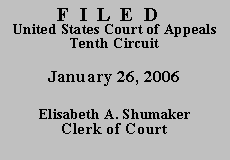

| JOSEPH A. ELLSWORTH,
Plaintiff-Appellant, v. GARY GIBSON, Warden O.S.P. in his Official Capacity and in his individual capacity; DODD, Correctional Officer O.S.P. in his Official Capacity and in his individual capacity; PRUITT, Unit Manager of "I" and "G" Units at O.S.P. in his Official Capacity and in his individual capacity; J STANSIFIRD, O.S.P. Deputy Warden in his Official Capacity and in his individual capacity; T LINDSEY, "I" Unit Case Manager in his Official Capacity and in his individual capacity; SPEARS, "I" Unit Case Manager in his Official Capacity and in his individual capacity; M RIDDLE, "I" Unit Case Manager in his Official Capacity and in his individual capacity; MORGAN, Night Shift Correctional Officer in his Official Capacity and in his individual capacity; MOODY, Day Shift Correctional Officer in his Official Capacity and in his individual capacity; SHERWOOD, Night Shift Correctional Officer in his Official Capacity and in his individual capacity; SHERRILL, Disciplinary Hearing Officer in his Official Capacity and in his individual capacity; D WORTHAM, Former "I" Unit Case Manager in his Official Capacity and in his individual capacity; STEWART, O.S.P. Physician in his Official Capacity and in his individual capacity, Defendants-Appellees. |
|
Mr. Ellsworth, an Oklahoma state prisoner proceeding pro se, sued defendants (officials and employees of the Oklahoma State Penitentiary) under 42 U.S.C. § 1983, alleging various violations of his rights under the United States Constitution. The district court dismissed the action because of Mr. Ellsworth's failure to comply with both the Federal Rules of Civil Procedure and a court order. Mr. Ellsworth appeals this decision. We affirm the judgment of the district court.
The district court's ruling of March 24, 2005, details the chronology of Mr. Ellsworth's failure to cooperate in discovery and comply with a court order. Defendants served Mr. Ellsworth with a set of interrogatories on May 13, 2003, asking him to state his case in his own words. When Mr. Ellsworth did not respond, defendants mailed two letters to him requesting his responses. Later defendants filed two motions to compel. On March 17, 2004, the district court granted the motions to compel and ordered Mr. Ellsworth to produce his responses by April 19, 2004. Sometime in December of 2004, Mr. Ellsworth provided unresponsive answers, generally stating that he could not answer because one of the defendants had destroyed his documentary evidence. Defendants then filed a motion to dismiss pursuant to Fed. R. Civ. P. 37(b)(2)(C).
Mr. Ellsworth did not respond to the dismissal motion, but he did file a response to the court's show-cause order. He asserted that defendants had made it difficult to respond to discovery by stealing his evidence and placing him in solitary confinement on a fabricated charge. The district court granted defendants' motion to dismiss.
"[W]e review the district court's decision to dismiss for discovery violations under an abuse of discretion standard." Ehrenhaus v. Reynolds, 965 F.2d 916, 920 (10th Cir. 1992). Because "dismissal represents an extreme sanction appropriate only in cases of willful misconduct," however, the district court must ensure that dismissal is a just sanction for the offending party's actions. Id. Thus, in addition to considering the culpability of the offending party, a court should consider:
(1) the degree of actual prejudice to the defendant; (2) the amount of interference with the judicial process; (3) the culpability of the litigant; (4) whether the court warned the party in advance that dismissal of the action would be a likely sanction for noncompliance; and (5) the efficacy of lesser sanctions.
Id. at 921 (quotation and citations omitted). If "a party appears pro se, the court should carefully assess whether it might appropriately impose some sanction other than dismissal, so that the party does not unknowingly lose its right of access to the courts because of a technical violation." Id. at 920 n.3
The district court analyzed the actions of Mr. Ellsworth under the five relevant factors. It determined that: (1) Mr. Ellsworth's failure to provide particularized information meant that defendants were unable to proceed with their defense; (2) his behavior stalled the judicial process; (3) his motives were questionable; (4) defendants' motion to dismiss and the court's show-cause order provided Mr. Ellsworth with knowledge of the possibility of dismissal; and (5) the aggravating factors outweighed the judicial system's predisposition to resolve a case on its merits. The court also noted that Mr. Ellsworth's allegations of document destruction were of little import. Defendants did not request documentation from Mr. Ellsworth, they simply asked him to explain the factual basis of his case. Upon consideration, the court concluded that no lesser sanction would serve the interest of justice. The court therefore granted defendants' motion to dismiss.
On appeal, Mr. Ellsworth narrates his difficulties in litigating from a disciplinary unit, claims that defendants failed to respond to his own discovery requests, and asserts that defendants' motion cannot constitute forewarning of dismissal.(1)
After reviewing the record, we conclude that Mr. Ellsworth's arguments have no merit and that the district court was well within its discretion in dismissing the action. The judgment of the district court is AFFIRMED. Mr. Ellsworth is reminded that he must continue to make partial payments until his filing fee is paid in full.
Entered for the Court
Circuit Judge
*. This order and judgment is not binding precedent, except under the doctrines of law of the case, res judicata, and collateral estoppel. The court generally disfavors the citation of orders and judgments; nevertheless, an order and judgment may be cited under the terms and conditions of 10th Cir. R. 36.3.
1. We note that Mr. Ellsworth failed to attach a copy of the court's dismissal order to his opening brief, as required by 10th Cir. R. 28.2(A)(1). We remind counsel for defendants that if an appellant's brief omits a required ruling, then appellees are to include it in their response brief. See 10th Cir. R. 28.2(B).